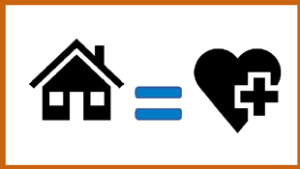Housing is Health: Care Navigation for Homeless Patients
It is well known that the most significant social determinant of health is safe, affordable housing. With several thousand men, women and children in Milwaukee County considered homeless or ‘precariously housed,’ the Partnership began discussions with the Milwaukee County Housing Division (MCHD) in 2018 to better understand the scope of homelessness in the community. They identified intersections with health care delivery, and learned together, how they might create systems to help homeless individuals – especially those with complex medical and behavioral health needs – secure sustainable housing and supportive services.
This year, the Partnership launched a Housing is Health initiative for homeless patients receiving care in four Milwaukee hospitals. The initiative incorporates MCHD social workers or “navigators,” who will help patients secure temporary housing, provide case management, and aid in their ultimate transition to permanent housing stability. Navigators will help patients secure supportive services such as public benefits, mental health / AODA treatment, tenancy education, and employment counseling. MCHD navigators will work with each patient from the time of contact until the individual is considered ‘housing stable,’ which can extend over many months.
Currently, Housing is Health initiative features two demonstration projects; one focused on inpatients and one on ER patients (launching later this fall). MCHD housing navigators will connect with inpatients prior to hospital discharge and with ER patients during, or right after their ER visit. Combined, the demonstration projects are likely to serve more than 200 patients over the next two years.
Housing is Health projects are aligned with the MCHD’s Housing First model, which has shown that stable, permanent housing has a positive impact on health outcomes and yields cost-savings by mitigating the utilization of inpatient and emergency services once someone is housed. MCHD has seen excellent outcomes working with the hardest to serve individuals who have often been homeless for years on the streets of Milwaukee. The success of the Housing First model in Milwaukee County has proven that once individuals are successfully housed and their basic needs met, they are far more likely to engage in mental health care, substance use treatment and other supportive services.
